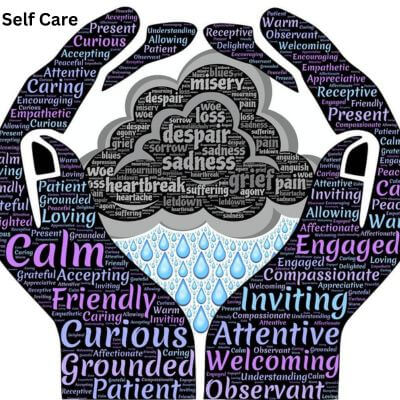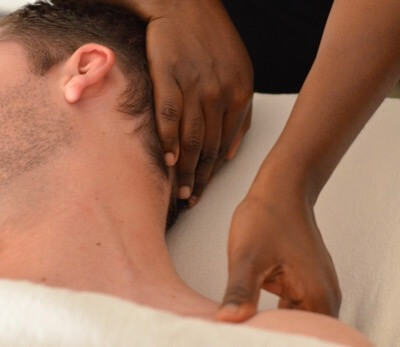- Home
- Benefits of Massage
- Ways to Practice Self Care
As an affiliate with Bookshop, Amazon, and other programs, I may earn revenue from qualifying purchases through affiliate links. This does not affect the price you pay. Privacy Policy / Disclosures. This site is for educational purposes only.
Search this site:
Ways to Practice Self Care: Tips, Techniques, and Tools
Self care is anything that helps you feel good and stay healthy—physically, mentally, emotionally, and spiritually. Knowing various ways to practice self care is important because one size does not fit all, either all people or all in-the-moment needs of one person.

Why Is Self Care Important?
Caring for yourself involves acting intentionally to improve your overall health and well-being. The National Institute of Mental Health states the benefits of self care include reducing stress, lowering risk of illness, and increasing energy. You don't have to go big. Even daily small self-care moments can have a big effect.
When you prioritize your well-being, you're better equipped to handle everyday life. You're also more likely to feel energized, focused, productive, happy, and satisfied. You have more to give other people and are better able to show up fully in your relationships and be present for the people you care about.
How to Do Self Care
Nurturing yourself has four components: physical, mental, emotional, and spiritual. However, self-care activities for these areas often overlap. For example, spending time outdoors in nature supports both your physical and mental health, and many people find nature spiritually uplifting. Laughing both lightens your mental load and induces physical changes in your body, according to the Mayo Clinic.
As you look at the list of self-care activities, identify ones that nourish you. If you don't enjoy an activity, it's not nurturing. Ask yourself what you need, wait for an honest answer, and follow through on it.
Physical Ways to Practice Self Care
Taking care of your physical body promotes good health. You already know you need to get enough sleep, exercise, eat a nutritious diet, and drink enough water. Here's a further list of self-care activities to support your physical well-being:
- Take regular breaks throughout the day to stretch, move your body, and give your mind a rest. Do relaxation exercises as needed.
- Spend time outdoors for at least a few minutes everyday. Sunlight helps regulate your sleep cycle, produce vitamin D, and more!
- Care for your feet—they support your entire body. Taking care of your feet can prevent not only foot pain but also pain in the knees, hips, and lower back.
- Enjoy healthy touch, both from family and friends and by receiving professional massage therapy or foot reflexology.
- Pay attention to your breathing. Are you breathing deeply throughout the day? If needed, practice deep breathing or other breathing techniques.
- Practice body awareness and pay attention to your body so you know when something is off. One way is to do a daily five-minute body scan, head to toe.
- Use good ergonomics (proper use of the body), whether sitting at a computer or playing a sport, to avoid pain and repetitive stress injury. Get instruction, if necessary.
- Improve your body function with somatic practices that teach your body to move with ease.
- Be mindful of the products you put on your body. Many skin-care products contain chemicals you may be better off without. You can use essential oils to make your own skin-care blends.
- Deal with medical conditions, physical pain, or injury rather than letting them linger.
Mental Ways to Practice Self Care
Taking care of your mental health helps you live a fuller life.
- Practice mindfulness. Focus your attention on the present moment without judgement.
- Set boundaries. Learn to say no to activities and requests that don't interest or serve you.
- Spend time doing things you enjoy. This includes developing a creative outlet such as writing, drawing, painting, woodworking, sewing, cooking, any type of arts and crafts, or any activity that inspires you. Learn new things. Read books, take classes, or pursue hobbies that challenge your mind and keep you engaged.
- Practice gratitude and appreciation. Taking time each day to reflect on the things and people you appreciate can help shift your perspective and improve your mood.
- Cultivate a positive mindset and outlook on life. Research shows optimists live longer and are happier than pessimists. Sometimes unplug from or limit exposure to news and social media, which tend to focus on the negative. Also, use positive self-talk to maintain a healthier inner dialogue, and surround yourself with positive influences.
- Take care of the places around you and the places you love. For example, declutter your home, your life, your computer. Create a peaceful, supportive environment in your work and living spaces.
- Practice financial self care. Learn financial concepts and determine how to use your money wisely to avoid stress about money.
If you deal with ongoing issues like anxiety or depression, work with a mental health professional.
Emotional Self Care
Taking care of yourself emotionally means being aware of your emotions and taking the steps needed to honor and care for these emotions. All emotions are "energy in motion." They are not good or bad. They are just energy. You can choose what to do with that energy.
Acknowledge your feelings. Sadness, fear, frustration, overwhelmed, and anger are all normal human responses, just as are love, joy, excitement, and more. Just because you feel something doesn't mean you have to act on it in the moment. Consciously choose how to respond. Find healthy outlets for expressing your emotions, such as talking to someone about your feelings or expressing yourself through creative activities. Other suggestions:
- Journal. Write down your thoughts and feelings to help you process your emotions and gain clarity. Other options include drawing or painting your emotions.
- Spend time with loved ones who support, uplift, and inspire you. Participate in social activities you enjoy.
- Cultivate self-compassion. Treat yourself with the same kindness and understanding that you would a close friend.
- Accept compliments. The only appropriate response is "thank you," regardless of whether you agree.
- Stop apologizing for being you. When you do so, you’re putting out the idea that who you are isn’t acceptable.
- Let go of resentments. Holding onto resentment against someone is like taking poison and expecting the other person to die.
Be gentle on yourself and others. Everyone, including you, is doing the best they can.
If you face ongoing emotional issues or challenges, see a counselor or therapist to help you work through them.
Spiritual Self Care
Nurturing your spirit involves activities that give you a sense of meaning and connection. This doesn't require a religious practice, but if you have one, nurture it.
- Pray, if you have a religious practice. The most effective prayer is one of gratitude.
- Meditate. Clearing clutter from your mind allows new, potentially more productive, thoughts to come to you.
- Read books or other materials that inspire and spiritually uplift you.
- Connect with the natural world and find peace and tranquility in outdoor spaces.
- Explore your beliefs and values. Reflect on what you believe and what's important to you.
- Find ways to connect with something greater than yourself, such as volunteering, serving others, or joining a spiritual community.
How to Create a Self-Care Plan
Creating a plan helps you make self care a habit. Start with small, manageable practices and gradually add what you need.
- Assess your needs by reflecting on the areas of your life that could benefit from more self care.
- Identify what you want from your self-care practice.
- Create a consistent routine for your practices, while also giving yourself flexibility.
- Prioritize self-care activities by scheduling them like you do other life priorities.
- Note your progress by keeping a journal or using an app.
- Read personal development and self care books that offer guidance and inspiration.
- Be patient—self care is a journey and not a destination.
Taking care of your well-being in all areas of life equips you to better handle the challenges of everyday life. Use the ways to practice self care in this guide to create a practice that works for you and helps you achieve a healthier and happier life. Start small, be consistent yet flexible, and celebrate your successes along the way.
Photo Credit: John Hain / Pixabay




